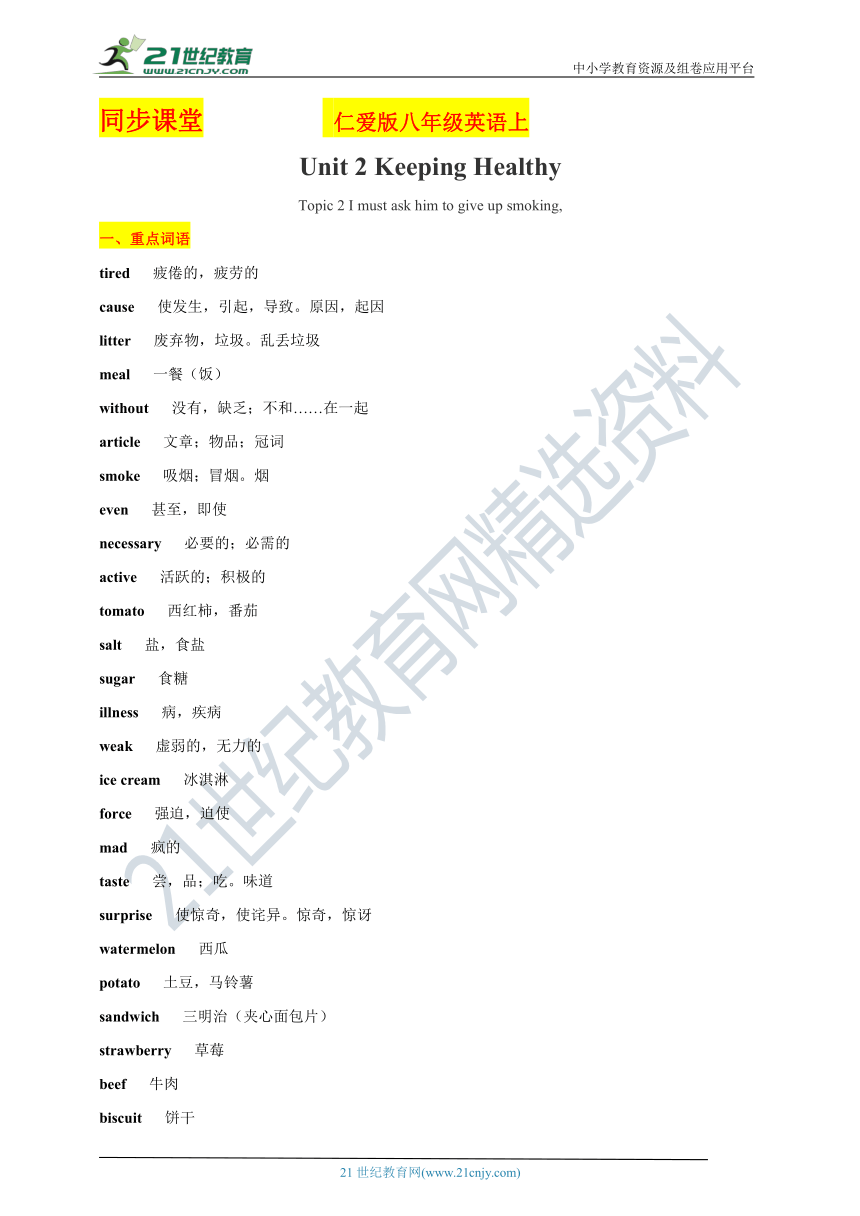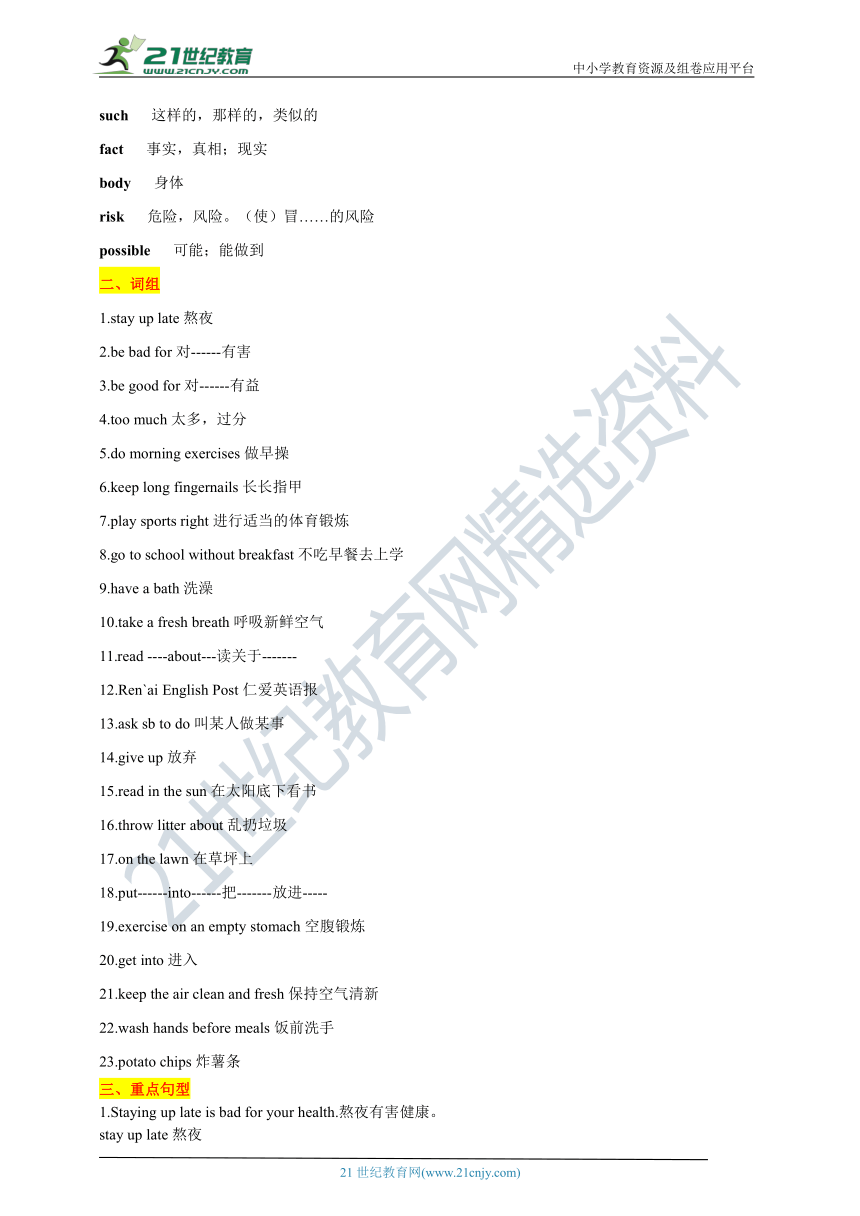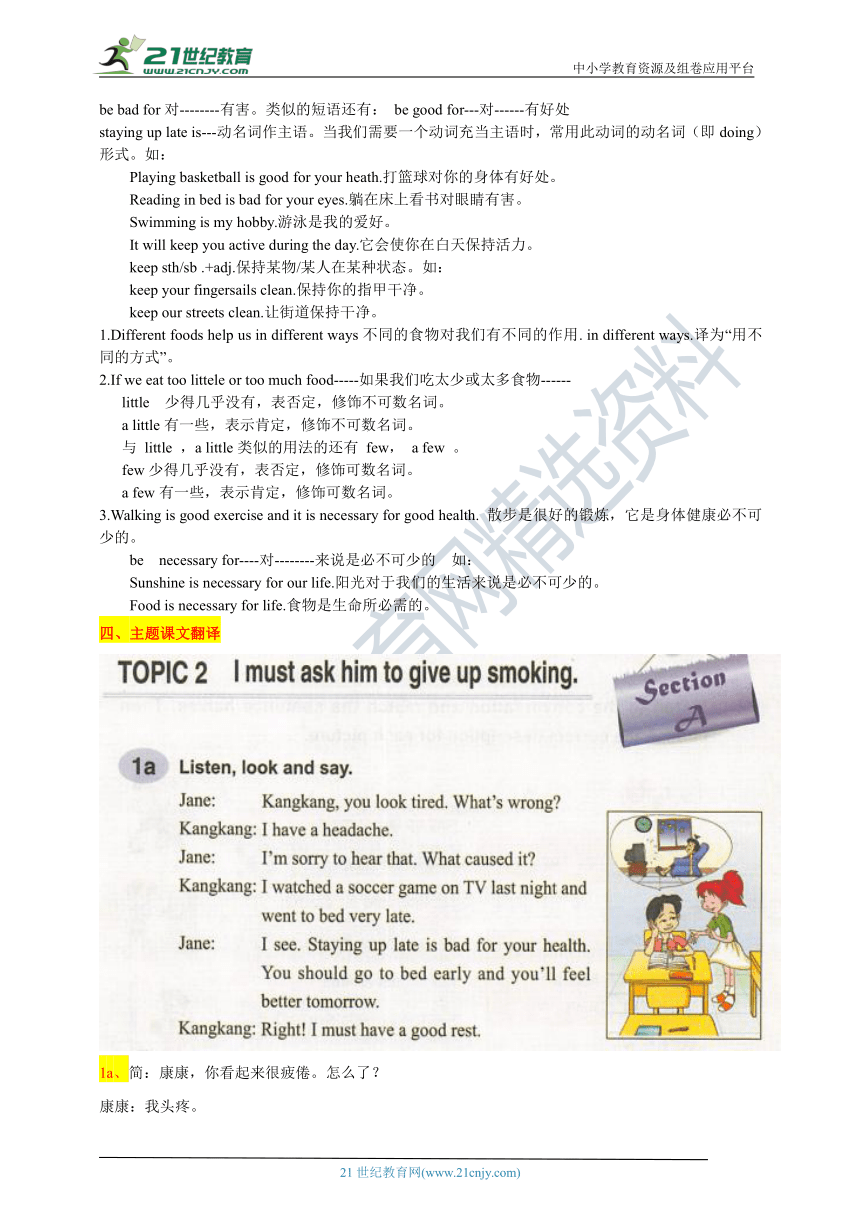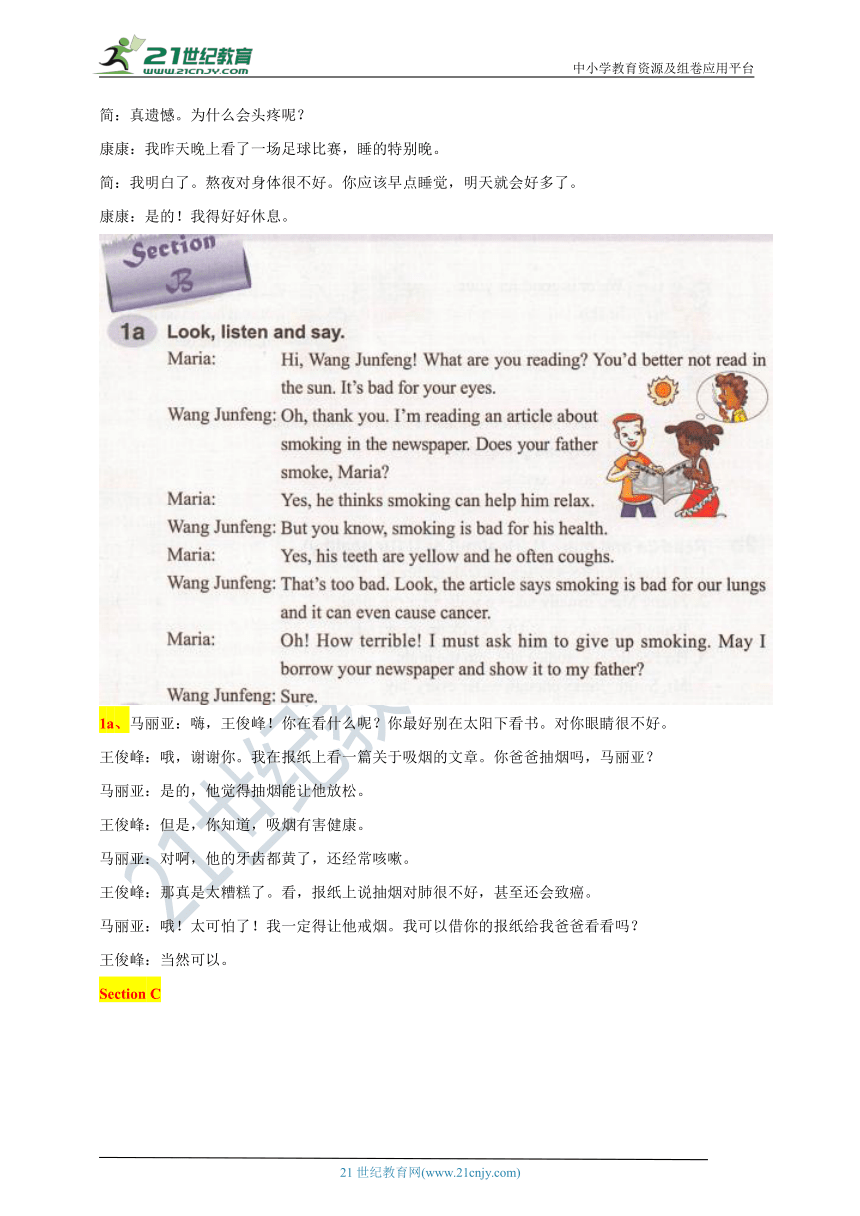U2 Topic 2 I must ask him to give up smoking,同步课堂
文档属性
| 名称 | U2 Topic 2 I must ask him to give up smoking,同步课堂 |

|
|
| 格式 | doc | ||
| 文件大小 | 1.1MB | ||
| 资源类型 | 试卷 | ||
| 版本资源 | 仁爱科普版 | ||
| 科目 | 英语 | ||
| 更新时间 | 2021-08-04 09:16:28 | ||
图片预览




文档简介
中小学教育资源及组卷应用平台
同步课堂 仁爱版八年级英语上
Unit 2 Keeping Healthy
Topic 2 I must ask him to give up smoking,
一、重点词语
tired 疲倦的,疲劳的
cause 使发生,引起,导致。原因,起因
litter 废弃物,垃圾。乱丢垃圾
meal 一餐(饭)
without 没有,缺乏;不和……在一起
article 文章;物品;冠词
smoke 吸烟;冒烟。烟
even 甚至,即使
necessary 必要的;必需的
active 活跃的;积极的
tomato 西红柿,番茄
salt 盐,食盐
sugar 食糖
illness 病,疾病
weak 虚弱的,无力的
ice cream 冰淇淋
force 强迫,迫使
mad 疯的
taste 尝,品;吃。味道
surprise 使惊奇,使诧异。惊奇,惊讶
watermelon 西瓜
potato 土豆,马铃薯
sandwich 三明治(夹心面包片)
strawberry 草莓
beef 牛肉
biscuit 饼干
such 这样的,那样的,类似的
fact 事实,真相;现实
body 身体
risk 危险,风险。(使)冒……的风险
possible 可能;能做到
二、词组
1.stay up late熬夜
2.be bad for对------有害
3.be good for对------有益
4.too much太多,过分
5.do morning exercises做早操
6.keep long fingernails长长指甲
7.play sports right进行适当的体育锻炼
8.go to school without breakfast不吃早餐去上学
9.have a bath洗澡
10.take a fresh breath呼吸新鲜空气
11.read ----about---读关于-------
12.Ren`ai English Post仁爱英语报
13.ask sb to do叫某人做某事
14.give up放弃
15.read in the sun在太阳底下看书
16.throw litter about乱扔垃圾
17.on the lawn在草坪上
18.put------into------把-------放进-----
19.exercise on an empty stomach空腹锻炼
20.get into进入
21.keep the air clean and fresh保持空气清新
22.wash hands before meals饭前洗手
23.potato chips炸薯条
三、重点句型
1.Staying up late is bad for your health.熬夜有害健康。
stay up late熬夜
be bad for对--------有害。类似的短语还有: be good for---对------有好处
staying up late is---动名词作主语。当我们需要一个动词充当主语时,常用此动词的动名词(即doing)形式。如:
Playing basketball is good for your heath.打篮球对你的身体有好处。
Reading in bed is bad for your eyes.躺在床上看书对眼睛有害。
Swimming is my hobby.游泳是我的爱好。
It will keep you active during the day.它会使你在白天保持活力。
keep sth/sb .+adj.保持某物/某人在某种状态。如:
keep your fingersails clean.保持你的指甲干净。
keep our streets clean.让街道保持干净。
1.Different foods help us in different ways不同的食物对我们有不同的作用. in different ways.译为“用不同的方式”。
2.If we eat too littele or too much food-----如果我们吃太少或太多食物------
little 少得几乎没有,表否定,修饰不可数名词。
a little有一些,表示肯定,修饰不可数名词。
与 little ,a little类似的用法的还有 few, a few 。
few少得几乎没有,表否定,修饰可数名词。
a few有一些,表示肯定,修饰可数名词。
3.Walking is good exercise and it is necessary for good health. 散步是很好的锻炼,它是身体健康必不可少的。
be necessary for----对--------来说是必不可少的 如:
Sunshine is necessary for our life.阳光对于我们的生活来说是必不可少的。
Food is necessary for life.食物是生命所必需的。
主题课文翻译
1a、简:康康,你看起来很疲倦。怎么了?
康康:我头疼。
简:真遗憾。为什么会头疼呢?
康康:我昨天晚上看了一场足球比赛,睡的特别晚。
简:我明白了。熬夜对身体很不好。你应该早点睡觉,明天就会好多了。
康康:是的!我得好好休息。
1a、马丽亚:嗨,王俊峰!你在看什么呢?你最好别在太阳下看书。对你眼睛很不好。
王俊峰:哦,谢谢你。我在报纸上看一篇关于吸烟的文章。你爸爸抽烟吗,马丽亚?
马丽亚:是的,他觉得抽烟能让他放松。
王俊峰:但是,你知道,吸烟有害健康。
马丽亚:对啊,他的牙齿都黄了,还经常咳嗽。
王俊峰:那真是太糟糕了。看,报纸上说抽烟对肺很不好,甚至还会致癌。
马丽亚:哦!太可怕了!我一定得让他戒烟。我可以借你的报纸给我爸爸看看吗?
王俊峰:当然可以。
Section C
1a、妈妈们让吃的食物
妈妈们经常告诉自己的孩子应该吃什么。
康康小时候,他妈妈经常跟他说,“不要吃太多盐或者糖。”她说这可能会让人生病。
马丽亚的妈妈经常把马丽亚照顾的很周到。例如,马丽亚的牙齿不好,所以她妈妈就不让她吃太多糖果或者冰激凌。
牛奶是健康的饮料。简并不喜欢喝,可是她妈妈经常逼她喝。她每天早上去上学前,都必须得喝一杯牛奶,因为她妈妈会监督她。
迈克尔小时候为了身体健康,必须得吃很多蔬菜和水果。有一次,迈克尔的盘子里有卷心菜。他一看到就生气了。但是他妈妈强迫他尝了尝。他很惊喜地发现卷心菜很好吃。
五、重点语言点
Section A
1. What’s up?= What’s happening ? = What’s wrong? = What’s the matter/trouble? 怎么了?
2. Staying up late is bad for your health.
(1) stay up = sit up熬夜, 如:we stayed up until midnight to see the New Year coming.
(2) 动词ing形式(动名词)可直接放句首作主语,谓语动词用单三形式。
3. too little 太少; too much 太多; 都用来修饰不可数名词。
4. going to school without breakfast 不吃早饭去上学。
Section B
1. You must not read in the sun.
in the sun 在阳光下(此处不能用under the sun )
2. I must ask him to give up smoking.
give up doing sth. = stop doing sth. 放弃做某事
3. Don’t throw litter about.
throw about 到处扔,如:throw litter about= throw about litter (litter是名词,即可以放后也可以放中间,但代词只能放中间,如:throw it about )
4. go for a walk 去散步; take a walk = have a walk 散步
5. It will keep you active during the day.
(1)keep + 宾语 + 补语 (补语可以是:动词ing 形式; 形容词; 介词短语 )
①I’m sorry to keep you waiting for such a long time. (keep sb. doing sth.使某人一直做某事 )
②Keep the door open, please. (keep sb/sth+形容词表示某人/某事物保持怎样的状态)
③Once a cold keep the child in bed for three days (keep sb+介词短语表示某人呆在某地)
(2) during the day = in the daytime 在白天
Section C
1. It may show that something is wrong with your health.
(1) show sb. sth. = show sth. to sb. 向某人展示某物 please show me your new book.
(2) show sb. around 某地 表带某人参观某地:I’ll show you around our school tomorrow.
2. You can get a headache when you exercise on an empty stomach.
on an empty stomach 空腹
3. We can get into the human body through the nose.
(1) get into 进入,陷入; 如:get into trouble 陷入麻烦
(2) ①through 从物体内部穿过, 如:walk through a forest. ② across 从物体表面横穿,如:go across the road ③ over 从物体上空越过, 如:fly over the city
4. The boy has an illness.
illness = sickness疾病(名词), 很少表示具体的疾病,只表示抽象的疾病,disease 常表某种疾病。如:heart disease 心脏病
Section D
1. As we know, good health is more important than wealth.
as we know = it is well know众所周知
2. Of course, we must also have the right kinds of food.
the right kinds of food 正确种类的食物
3. We should eat more fruit and less meat.
Eat more …. and less … 多吃… 少吃…
4. Different foods help us in different ways.
(1) food, fruit 等词常作不可数名词,后不加s, 但当强调多种食物或水果时,常用复数形式, 如different foods.
(2) in different ways 以不同的方式
5. It’s necessary for us to have healthy eating habits.
句型:It is + 形容词 + for sb. to do sth. (it代替后面的不定式) 对于某人来说,去做某事是…的, 如:It’s useful for us to learn English well.
六、语法学习
情态动词must及其否定形式 must not
must 译为“必须做------”其否定意义“不必做-------”,用don`t have to 表示,而不用must not 。如:
——must Ifinish it tonight?
——No, you don`t have to.
而must not 译作“禁止做--------”。如:
You must not throw litter about.
Don`t throw litter about.别到处乱扔垃圾。
情态动词may
may有两种含义,表示请求允许,译作“可以”。如:
May I come in ?我可以进来吗?
表示推测,译作“可能”。如:
You may get a headache when you work too hard.当你工作太累时你可能回感到头疼。
You may get a headache when you can`t get enough sleep. 当你睡眠不足时,你可能会头疼。
enough sleep 充足的睡眠。
enough 修饰名词时放在前后均可;当它修饰形容词时,一般放在形容词后面。如:
strong enough足够强壮
_21?????????è?????(www.21cnjy.com)_
同步课堂 仁爱版八年级英语上
Unit 2 Keeping Healthy
Topic 2 I must ask him to give up smoking,
一、重点词语
tired 疲倦的,疲劳的
cause 使发生,引起,导致。原因,起因
litter 废弃物,垃圾。乱丢垃圾
meal 一餐(饭)
without 没有,缺乏;不和……在一起
article 文章;物品;冠词
smoke 吸烟;冒烟。烟
even 甚至,即使
necessary 必要的;必需的
active 活跃的;积极的
tomato 西红柿,番茄
salt 盐,食盐
sugar 食糖
illness 病,疾病
weak 虚弱的,无力的
ice cream 冰淇淋
force 强迫,迫使
mad 疯的
taste 尝,品;吃。味道
surprise 使惊奇,使诧异。惊奇,惊讶
watermelon 西瓜
potato 土豆,马铃薯
sandwich 三明治(夹心面包片)
strawberry 草莓
beef 牛肉
biscuit 饼干
such 这样的,那样的,类似的
fact 事实,真相;现实
body 身体
risk 危险,风险。(使)冒……的风险
possible 可能;能做到
二、词组
1.stay up late熬夜
2.be bad for对------有害
3.be good for对------有益
4.too much太多,过分
5.do morning exercises做早操
6.keep long fingernails长长指甲
7.play sports right进行适当的体育锻炼
8.go to school without breakfast不吃早餐去上学
9.have a bath洗澡
10.take a fresh breath呼吸新鲜空气
11.read ----about---读关于-------
12.Ren`ai English Post仁爱英语报
13.ask sb to do叫某人做某事
14.give up放弃
15.read in the sun在太阳底下看书
16.throw litter about乱扔垃圾
17.on the lawn在草坪上
18.put------into------把-------放进-----
19.exercise on an empty stomach空腹锻炼
20.get into进入
21.keep the air clean and fresh保持空气清新
22.wash hands before meals饭前洗手
23.potato chips炸薯条
三、重点句型
1.Staying up late is bad for your health.熬夜有害健康。
stay up late熬夜
be bad for对--------有害。类似的短语还有: be good for---对------有好处
staying up late is---动名词作主语。当我们需要一个动词充当主语时,常用此动词的动名词(即doing)形式。如:
Playing basketball is good for your heath.打篮球对你的身体有好处。
Reading in bed is bad for your eyes.躺在床上看书对眼睛有害。
Swimming is my hobby.游泳是我的爱好。
It will keep you active during the day.它会使你在白天保持活力。
keep sth/sb .+adj.保持某物/某人在某种状态。如:
keep your fingersails clean.保持你的指甲干净。
keep our streets clean.让街道保持干净。
1.Different foods help us in different ways不同的食物对我们有不同的作用. in different ways.译为“用不同的方式”。
2.If we eat too littele or too much food-----如果我们吃太少或太多食物------
little 少得几乎没有,表否定,修饰不可数名词。
a little有一些,表示肯定,修饰不可数名词。
与 little ,a little类似的用法的还有 few, a few 。
few少得几乎没有,表否定,修饰可数名词。
a few有一些,表示肯定,修饰可数名词。
3.Walking is good exercise and it is necessary for good health. 散步是很好的锻炼,它是身体健康必不可少的。
be necessary for----对--------来说是必不可少的 如:
Sunshine is necessary for our life.阳光对于我们的生活来说是必不可少的。
Food is necessary for life.食物是生命所必需的。
主题课文翻译
1a、简:康康,你看起来很疲倦。怎么了?
康康:我头疼。
简:真遗憾。为什么会头疼呢?
康康:我昨天晚上看了一场足球比赛,睡的特别晚。
简:我明白了。熬夜对身体很不好。你应该早点睡觉,明天就会好多了。
康康:是的!我得好好休息。
1a、马丽亚:嗨,王俊峰!你在看什么呢?你最好别在太阳下看书。对你眼睛很不好。
王俊峰:哦,谢谢你。我在报纸上看一篇关于吸烟的文章。你爸爸抽烟吗,马丽亚?
马丽亚:是的,他觉得抽烟能让他放松。
王俊峰:但是,你知道,吸烟有害健康。
马丽亚:对啊,他的牙齿都黄了,还经常咳嗽。
王俊峰:那真是太糟糕了。看,报纸上说抽烟对肺很不好,甚至还会致癌。
马丽亚:哦!太可怕了!我一定得让他戒烟。我可以借你的报纸给我爸爸看看吗?
王俊峰:当然可以。
Section C
1a、妈妈们让吃的食物
妈妈们经常告诉自己的孩子应该吃什么。
康康小时候,他妈妈经常跟他说,“不要吃太多盐或者糖。”她说这可能会让人生病。
马丽亚的妈妈经常把马丽亚照顾的很周到。例如,马丽亚的牙齿不好,所以她妈妈就不让她吃太多糖果或者冰激凌。
牛奶是健康的饮料。简并不喜欢喝,可是她妈妈经常逼她喝。她每天早上去上学前,都必须得喝一杯牛奶,因为她妈妈会监督她。
迈克尔小时候为了身体健康,必须得吃很多蔬菜和水果。有一次,迈克尔的盘子里有卷心菜。他一看到就生气了。但是他妈妈强迫他尝了尝。他很惊喜地发现卷心菜很好吃。
五、重点语言点
Section A
1. What’s up?= What’s happening ? = What’s wrong? = What’s the matter/trouble? 怎么了?
2. Staying up late is bad for your health.
(1) stay up = sit up熬夜, 如:we stayed up until midnight to see the New Year coming.
(2) 动词ing形式(动名词)可直接放句首作主语,谓语动词用单三形式。
3. too little 太少; too much 太多; 都用来修饰不可数名词。
4. going to school without breakfast 不吃早饭去上学。
Section B
1. You must not read in the sun.
in the sun 在阳光下(此处不能用under the sun )
2. I must ask him to give up smoking.
give up doing sth. = stop doing sth. 放弃做某事
3. Don’t throw litter about.
throw about 到处扔,如:throw litter about= throw about litter (litter是名词,即可以放后也可以放中间,但代词只能放中间,如:throw it about )
4. go for a walk 去散步; take a walk = have a walk 散步
5. It will keep you active during the day.
(1)keep + 宾语 + 补语 (补语可以是:动词ing 形式; 形容词; 介词短语 )
①I’m sorry to keep you waiting for such a long time. (keep sb. doing sth.使某人一直做某事 )
②Keep the door open, please. (keep sb/sth+形容词表示某人/某事物保持怎样的状态)
③Once a cold keep the child in bed for three days (keep sb+介词短语表示某人呆在某地)
(2) during the day = in the daytime 在白天
Section C
1. It may show that something is wrong with your health.
(1) show sb. sth. = show sth. to sb. 向某人展示某物 please show me your new book.
(2) show sb. around 某地 表带某人参观某地:I’ll show you around our school tomorrow.
2. You can get a headache when you exercise on an empty stomach.
on an empty stomach 空腹
3. We can get into the human body through the nose.
(1) get into 进入,陷入; 如:get into trouble 陷入麻烦
(2) ①through 从物体内部穿过, 如:walk through a forest. ② across 从物体表面横穿,如:go across the road ③ over 从物体上空越过, 如:fly over the city
4. The boy has an illness.
illness = sickness疾病(名词), 很少表示具体的疾病,只表示抽象的疾病,disease 常表某种疾病。如:heart disease 心脏病
Section D
1. As we know, good health is more important than wealth.
as we know = it is well know众所周知
2. Of course, we must also have the right kinds of food.
the right kinds of food 正确种类的食物
3. We should eat more fruit and less meat.
Eat more …. and less … 多吃… 少吃…
4. Different foods help us in different ways.
(1) food, fruit 等词常作不可数名词,后不加s, 但当强调多种食物或水果时,常用复数形式, 如different foods.
(2) in different ways 以不同的方式
5. It’s necessary for us to have healthy eating habits.
句型:It is + 形容词 + for sb. to do sth. (it代替后面的不定式) 对于某人来说,去做某事是…的, 如:It’s useful for us to learn English well.
六、语法学习
情态动词must及其否定形式 must not
must 译为“必须做------”其否定意义“不必做-------”,用don`t have to 表示,而不用must not 。如:
——must Ifinish it tonight?
——No, you don`t have to.
而must not 译作“禁止做--------”。如:
You must not throw litter about.
Don`t throw litter about.别到处乱扔垃圾。
情态动词may
may有两种含义,表示请求允许,译作“可以”。如:
May I come in ?我可以进来吗?
表示推测,译作“可能”。如:
You may get a headache when you work too hard.当你工作太累时你可能回感到头疼。
You may get a headache when you can`t get enough sleep. 当你睡眠不足时,你可能会头疼。
enough sleep 充足的睡眠。
enough 修饰名词时放在前后均可;当它修饰形容词时,一般放在形容词后面。如:
strong enough足够强壮
_21?????????è?????(www.21cnjy.com)_
同课章节目录
- Unit 1 Playing Sports
- Topic 1 I'm going to play basketball.
- Topic 2 I'll kick you the ball again.
- Topic 3 The school sports meet is coming.
- Unit 2 Keeping Healthy
- Topic 1 You should brush your teeth twice a day.
- Topic 2 I must ask him to give up smoking.
- Topic 3 Must we exercise to prevent the flu?
- Unit 3 Our Hobbies
- Topic 1 What's your hobby?
- Topic 2 What sweet music!
- Topic 3 What were you doing at this time yesterday
- Unit 4 Our World
- Topic 1 What's the strongest animal on the farm?
- Topic 2 How can we protect ourselves from the eart
- Topic 3 The Internet makes the world smaller.
